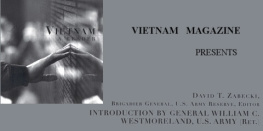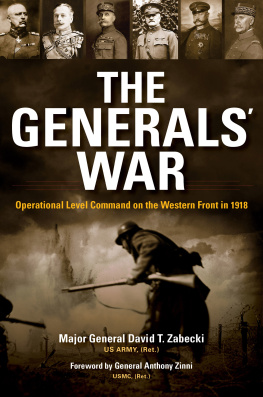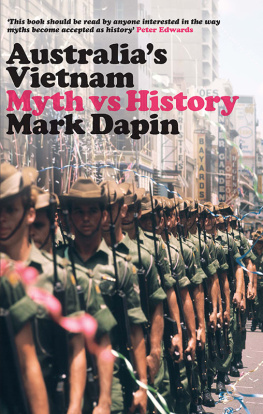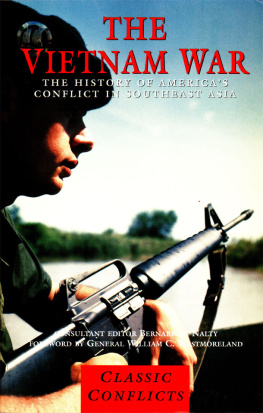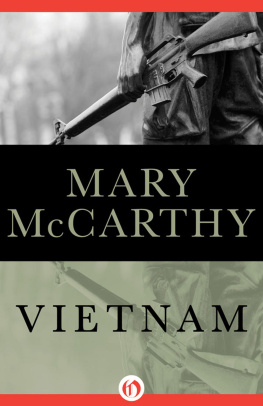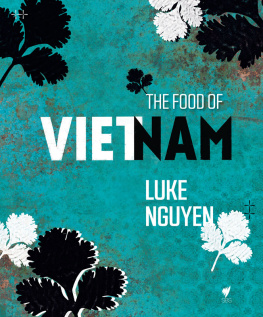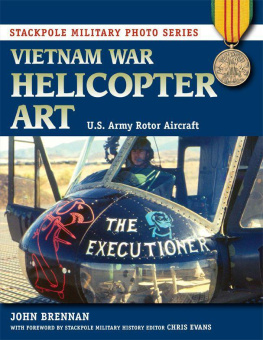David T. Zabecki - Vietnam, a Reader
Here you can read online David T. Zabecki - Vietnam, a Reader full text of the book (entire story) in english for free. Download pdf and epub, get meaning, cover and reviews about this ebook. publisher: ibooks, Inc., genre: History. Description of the work, (preface) as well as reviews are available. Best literature library LitArk.com created for fans of good reading and offers a wide selection of genres:
Romance novel
Science fiction
Adventure
Detective
Science
History
Home and family
Prose
Art
Politics
Computer
Non-fiction
Religion
Business
Children
Humor
Choose a favorite category and find really read worthwhile books. Enjoy immersion in the world of imagination, feel the emotions of the characters or learn something new for yourself, make an fascinating discovery.
- Book:Vietnam, a Reader
- Author:
- Publisher:ibooks, Inc.
- Genre:
- Rating:3 / 5
- Favourites:Add to favourites
- Your mark:
- 60
- 1
- 2
- 3
- 4
- 5
Vietnam, a Reader: summary, description and annotation
We offer to read an annotation, description, summary or preface (depends on what the author of the book "Vietnam, a Reader" wrote himself). If you haven't found the necessary information about the book — write in the comments, we will try to find it.
Vietnam, a Reader — read online for free the complete book (whole text) full work
Below is the text of the book, divided by pages. System saving the place of the last page read, allows you to conveniently read the book "Vietnam, a Reader" online for free, without having to search again every time where you left off. Put a bookmark, and you can go to the page where you finished reading at any time.
Font size:
Interval:
Bookmark:

An ibooks, Inc. ebook
ibooks, Inc.
24 West 25th St.
New York, NY 10010
The ibooks World Wide Web Site Address is:
http://www.ibooksinc.com
Copyright 2002 by ibooks, Inc. and PRIMEDIA Enthusiast Group, a PRIMEDIA Company.
e-ISBN: 1-59176-019-4
Print ISBN: 0-7434-3504-4
This book is dedicated to Vietnam Magazines founding editor, Colonel Harry G. Summers, Jr.
Photos courtesy of the National Archives and the Library of Congress.


By Brigadier General David Zabecki, U.S. Army Reserve
There were, however, some unique aspects about Vietnam. For one thing, it was one of the few wars in which the side that won all the battles still lost the war. This happened because there was a total disconnect between Americas battlefield tactics and its overarching war fighting strategyor more accurately, the total absence of such strategy. While many analysts and military historians today remain divided on the efficacy of American tactics in Vietnam, there is almost universal agreement that the basic strategy was bankrupt. There was never a precise objective; never a clearly articulated end-state. Colonel Harry G. Summers, Jr., the founding editor of Vietnam magazine, laid this all out in his book, On Strategy: The Vietnam War in Context, an insightful analysis of Americas strategic failure. It remains one of the most important books about Vietnam ever written.
Vietnam also was the first television war, the first prime-time war. For the first time in history raw combat footage was beamed directly into the living rooms of Americans (and the rest of the world) within hours of the event. Television, however, proved to be a great tool for recording sensational actions, but very limited in its ability to explain those events and place them in the broader context. Thus, the Viet Cong attack on the American Embassy during the Tet Offensive became in the American publics mind a military disaster second only to the attack on Pearl Harbor, when in reality it was a piddling little platoon action, of almost no military significance. Regardless of the real underlying issues, the distortion of the perceptions on a daily basis contributed significantly to the undermining of public support for the war. The North Vietnamese recognized this American vulnerability, and they exploited it brilliantly.
One of the longer-term effects of the Vietnam War was a sense of distrust and even hostility between the military and the media. Many journalists felt the military lied to them and tried to manipulate them. Many in the military believed the medias unfair and inaccurate reporting cost them the support of the public. Its not as simple as all that, of course, but there are indicators that the reporting was selective. My Lai and Hue are probably the best examples. My Lai today is regarded as the defining atrocity of the Vietnam War. And it was a war crime. There can be no question of that. Yet, while the media covered the My Lai story from every conceivable angle, they virtually ignored the massacre of more than 6,000 civilians by Communist troops at Hue during the Tet Offensive. Almost every American high school student today has heard about My Lai. How many know about Hue?
The American people too came to distrust their own military, even to the point of blaming the war on the common soldiers who fought it. That general feeling was reinforced by the bloody rescue attempt on the Mayaguez and the failed rescue attempt of the hostages in Teheran. The actions in Grenada and Panama and the bombing of the Marine barracks in Beirut did little to improve public opinion about the military. It was only the Gulf War that finally started to change attitudes and allowed the American military to escape the long shadow of Vietnam. But virtually all the militarys senior leaders in the Gulf War, from Generals Colin Powell and Norman Schwarzkopf down to the brigade command level, were Vietnam veterans. And as this is being written, shortly after the deadly terrorist attacks of September 11, 2001, the American people have learned once again why they have a military.
The great irony about Vietnam is that even though it was the most thoroughly documented war in history to that time, it remained at the time and still remains shrouded in a cloud of misconceptions, bogus myths, and distorted facts. Although many people believe Vietnam was Americas longest war, the Philippine Insurrection was at least as long, and the Indian Wars were much longer. Nor was Vietnam necessarily Americas most unpopular and socially divisive war. It was the Civil War that tore apart American society like no other war in our history. And during the American Revolution roughly one third of the population supported the British, and another third didnt care one way or the other. Nor were the combat conditions really any worse or more intense in Vietnam than in most other wars. For horrible and protracted combat almost no other war can match the Western Front in World War I or the Eastern Front in World War II. One popular book published in the late 1980s actually claimed that more Americans died in Vietnam than in World War II which of course is utter nonsense.
Perhaps the worst myths and misconceptions about Vietnam are the ones that surround the soldiers, sailors, airmen, Coast Guardsmen, and Marines who served there. Many of those myths will not go away, despite the fact that author B.G. Burkett de-bunked most of them in his widely acclaimedand widely criticizedbook, Stolen Valor: How the Vietnam Generation was Robbed of its Heroes and its History. Contrary to the deeply-held popular beliefs, the majority of those Americans who served in Vietnam and the majority of those on The Wall were not draftees. Nor were minorities disproportionately represented or unfairly assigned. Vietnam, however, was the first war in American history in which a significant number of minorities served in higher level combat leadership positions. As a direct result, minorities today hold a greater proportion of positions at the highest levels in the U.S. military than in almost any other segment of American society.
Perhaps the most damaging and unfair of all the Vietnam myths is the enduring one of the Vietnam veteran as a drug-addicted loser who cant keep a job or hold a marriage together. Many studies have shown that the drug addiction, suicide, joblessness, and divorce rates among Vietnam veterans are no higher than for the population as a whole, and some studies have even shown them to be slightly lower. As Burkett points out, many of those Vietnam veterans decked out in ratty jungle fatigues and medals, telling their wild stories of killing babies and secret Special Forces assassination missions are complete phonies. Many never set foot in Vietnam, and some never even served a day in the military. For them, Vietnam provides a cover, a plausible excuse for an otherwise failed life. But it is not just the failures of Baby Boomer Generation who conjure up phony Vietnam War records for themselves. In recent years doctors, politicians, judges, and college professors have been unmasked as phony Vietnam veterans.
Font size:
Interval:
Bookmark:
Similar books «Vietnam, a Reader»
Look at similar books to Vietnam, a Reader. We have selected literature similar in name and meaning in the hope of providing readers with more options to find new, interesting, not yet read works.
Discussion, reviews of the book Vietnam, a Reader and just readers' own opinions. Leave your comments, write what you think about the work, its meaning or the main characters. Specify what exactly you liked and what you didn't like, and why you think so.

